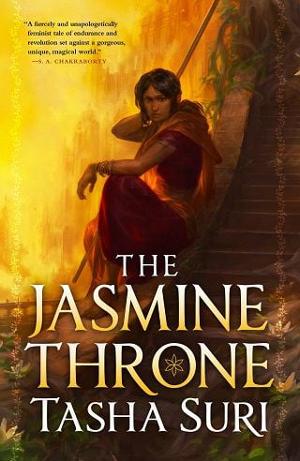Chapter 67: Malini
MALINI
The fires didn’t gutter until late morning.
When they finally died, the warriors made their way down to the remains of the monastery.
“You shouldn’t come, princess,” one warrior said. He had the length of his own shawl knotted around his face, leaving nothing but his eyes and the furrow of his brow visible. “The air is poisonous.”
She knew that. She could smell it, feel it, even from here.
“I must,” she said, and wrapped the long edge of her own sari around her mouth. The cloth was still faintly damp from the waters beneath the gardens—a green, ugly dampness. “But I will accept you as my guard, if you will accompany me.”
There were no priests or Parijati soldiers left alive. A few royal warriors had run for their lives, when the flames had begun. Many had been burned too badly to make it far, and Aditya’s men had found what remained of them at the edge of what remained of the bridge.
Some of the lords were already beginning to work out how a makeshift bridge would be built. There was precious little left in the lacquer gardens of use, but at least a handful of their own men were from Dwarali and knew how to climb perilous rock faces. Three offered to make the way down, with only rope to hold them steady, and seek a safe route or supplies.
As they discussed what options were available to them, Malini kneeled down upon the charred ground. The sun was warm upon her back. Over the grate that led to the water were panels of thick wood, nailed in place. They were scorched or burned beyond recognition, but Malini could see marks upon them, like those made by scrabbling animals upon the trunks of trees.
Nail marks. Someone had clawed at the cover of the entrances to the water. Someone had fought to survive. But Aditya’s men had sealed the exits carefully. The bridge had burned. They had died in terror and in pain.
She looked and felt… nothing. The nothing was so solid, so complete, that she knew it wasn’t true emptiness or true neutrality. It was a feeling like a fist around a throat.
“Princess,” the warrior said again. He sounded anxious. “Please.”
She took his offer of a hand and walked away from the dead.
And that night, after the Dwarali soldiers had long since departed, she dreamt. Narina and Alori sat at the end of her bed, their hands clasped, their hair haloed with crowns of silent flame.
“You are not real,” she told them. “I am done with the needle-flower.”
“But it isn’t done with you,” Narina said pityingly. “I am sorry for it, Malini. But here we are.”
“Malini,” Alori said. “Malini. What do you think your name would be, if you’d been born like me, a royal of the nameless faith? What do you think the priest would have whispered in your ear?”
Fate had not named her. But the choices men had made, and the choices she had made—when her brother had pressed a knife to her neck, when her brother had tried to see her burn—had shaped her and given her a purpose.
“I don’t think of it,” she said. “I don’t believe in it.”
“And yet the nameless thinks of you,” said Narina. “The spirits think of you. The mothers think of you.”
“I do not believe in the mothers any longer,” whispered Malini. “I do not believe that what Chandra did made anything more of you.”
“The universe is vaster and stranger than you know,” Alori said sorrowfully. “But, Malini…”
Her voice faded. Odd. She had not thought a vision could weep.
“When you murder your brothers, remember that we loved you once, heart sister,” Narina finished. “Remember that we love you still, no matter what you become.”
Malini closed her eyes, which burned with tears. She closed her eyes against the vision of them, and the grief. When she opened them, Narina and Alori were gone.
At dawn, one of the Dwarali soldiers returned. He came with more rope and a plan to make their laborious way down the cliff face, with the security of rope and a winch to guide them all down.
Malini thought of her treacherous descent of the Hirana and nearly laughed. Oh, if only Priya were here.
“Can you do this?” Rao asked.
“I can do whatever is needful,” she said.
They made their way down, Malini seated upon a sling of rope. She held it tightly and gazed at the drop beneath her—a great endless sweep of air, ending in jagged rocks. When she found her feet once more on steady ground, she did her best to hide her relief.
They began their journey. There could be no more dallying. They would need to meet their strongest forces, waiting upon the road to Dwarali, and pray that Chandra’s men had not come across them yet. They would follow the coast as much as possible. The lands there were beyond Parijatdvipa’s borders, and accordingly likely to be safer from Chandra’s spies or soldiers. Khalil relayed all of this, as Rao stood stiff and grief-stricken at Malini’s side, as Lata held her arm—as Aditya stood at the head of them all, quiet as a ghost.
“It will be a long journey,” the Dwarali lord said gruffly. “But we’ll rig a chariot for you, princess. Something suitable.”
“Dwarali women ride, don’t they?”
“We all ride,” he told her. “Man, woman, or any soul between.”
“It is a shame I do not have their skill,” she said. “This skill your Dwarali women possess.”
“Skills are learned, princess,” he said. “I think you will gain them swiftly enough.”
He spoke with a respect that verged on reverence. Malini simply nodded, eyes fixed on the distance, and kept on walking.
They had been traveling for days. Days. They were nowhere of consequence, a dirt track, surrounded by dust burnished bronze in the light of the setting sun, when Rao turned.
Lata’s grip tightened upon her arm. “Prince,” Lata said, voice firm. “Is it time?”
Rao’s expression—she had never seen the like of it. He looked determined and terrified all at once, staring at her, through her, his eyes blazing.
“It is time,” he said.
Lata exhaled. Her grip on Malini’s arm released. She stepped back, leaving Malini alone.
Rao took a step closer to Malini.
“Rao,” she said, suddenly frightened. “What is it?”
“You may mock our fates,” said Rao, “but you understand. We’d run from them if we could. To know your greatest purpose in life, or your inevitable end—it’s a terrible burden.
“I didn’t envy my sister her name,” Rao went on. “Not once I knew it. But even then, I believed my fate would be easier to bear. Now, I’m not so sure.”
Rao kneeled down before her. He did not kneel like a man overcome by grief, or as men in tales kneel before women they loved. He did not even kneel as he had when his sister had burned upon the pyre, with his face blank and his hands in fists, too devastated to move or breathe.
He kneeled and lowered his head. Touched his fingertips to the ground before her feet.
He kneeled as a man kneels before a king. An emperor.
“It’s time,” he said, in a clear voice, to Malini and all the assembled highborn of Parijatdvipa, “to tell you my name.”
 Fullepub
Fullepub 



